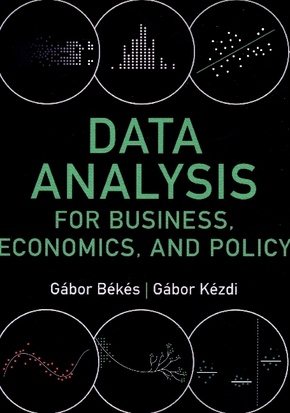Data Analysis for Business, Economics, and Policy
| Verlag | Cambridge University Press |
| Auflage | 2021 |
| Seiten | 744 |
| Format | 19,0 x 3,4 x 24,8 cm |
| Gewicht | 1590 g |
| Artikeltyp | Englisches Buch |
| EAN | 9781108716208 |
| Bestell-Nr | 10871620UA |
A comprehensive textbook on data analysis for business, applied economics and public policy that uses case studies with real-world data.
This textbook provides future data analysts with the tools, methods, and skills needed to answer data-focused, real-life questions; to carry out data analysis; and to visualize and interpret results to support better decisions in business, economics, and public policy. Data wrangling and exploration, regression analysis, machine learning, and causal analysis are comprehensively covered, as well as when, why, and how the methods work, and how they relate to each other. As the most effective way to communicate data analysis, running case studies play a central role in this textbook. Each case starts with an industry-relevant question and answers it by using real-world data and applying the tools and methods covered in the textbook. Learning is then consolidated by 360 practice questions and 120 data exercises. Extensive online resources, including raw and cleaned data and codes for all analysis in Stata, R, and Python, can be found at www.gabors-data-analysis.com.
Inhaltsverzeichnis:
Part I. Data Exploration: 1. Origins of data; 2. Preparing data for analysis; 3. Exploratory data analysis; 4. Comparison and correlation; 5. Generalizing from data; 6. Testing hypotheses; Part II. Regression Analysis: 7. Simple regression; 8. Complicated patterns and messy data; 9. Generalizing results of a regression; 10. Multiple linear regression; 11. Modeling probabilities; 12. Regression with time series data; Part III. Prediction: 13. A framework for prediction; 14. Model building for prediction; 15. Regression trees; 16. Random forest and boosting; 17. Probability prediction and classification; 18. Forecasting from time series data; Part IV. Causal Analysis: 19. A framework for causal analysis; 20. Designing and analyzing experiments; 21. Regression and matching with observational data; 22. Difference-in-differences; 23. Methods for panel data; 24. Appropriate control groups for panel data; Bibliography; Index.
Rezension:
'This exciting new text covers everything today's aspiring data scientist needs to know, managing to be comprehensive as well as accessible. Like a good confidence interval, the Gabors have got you almost completely covered!' Joshua Angrist, Massachusetts Institute of Technology

